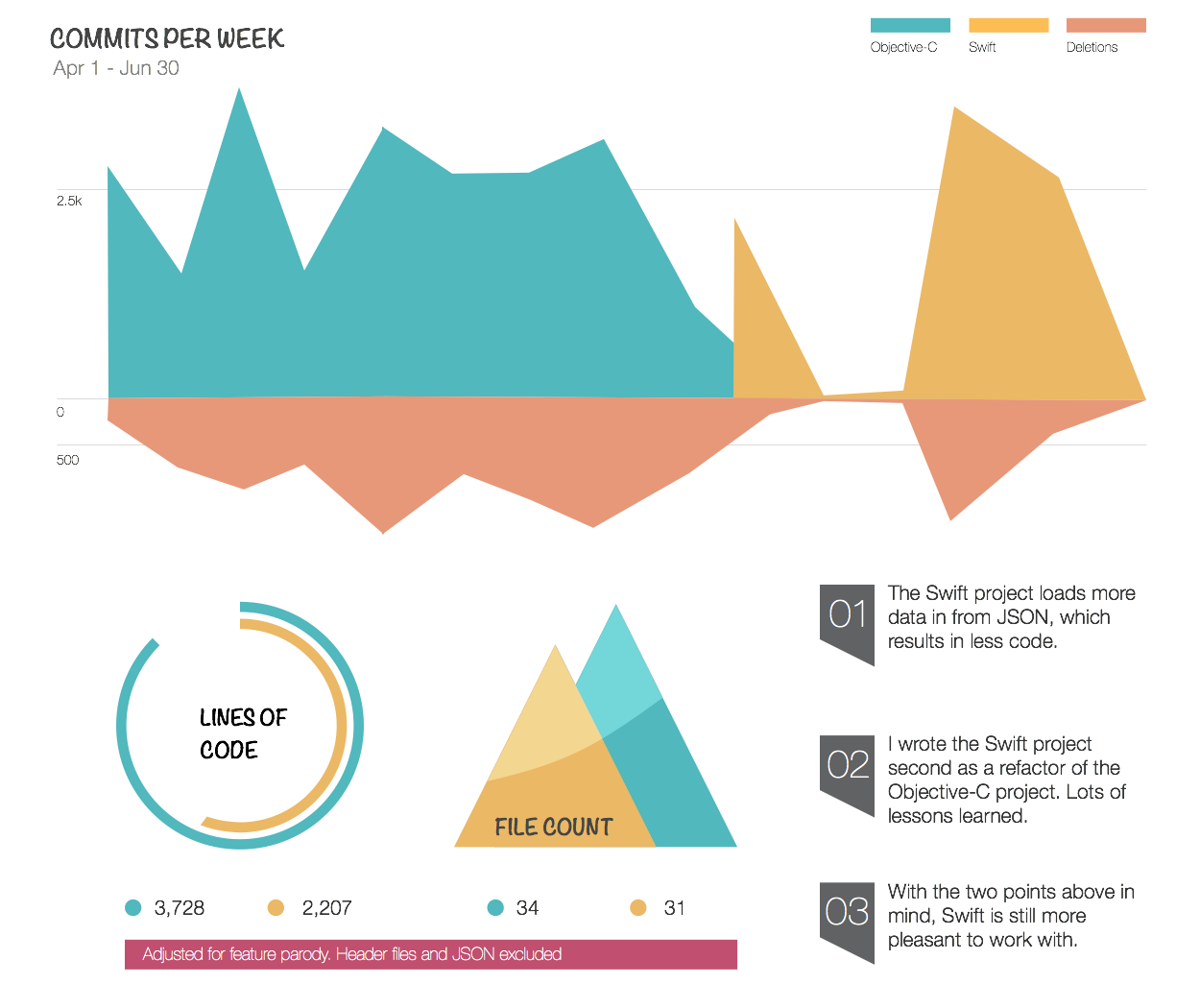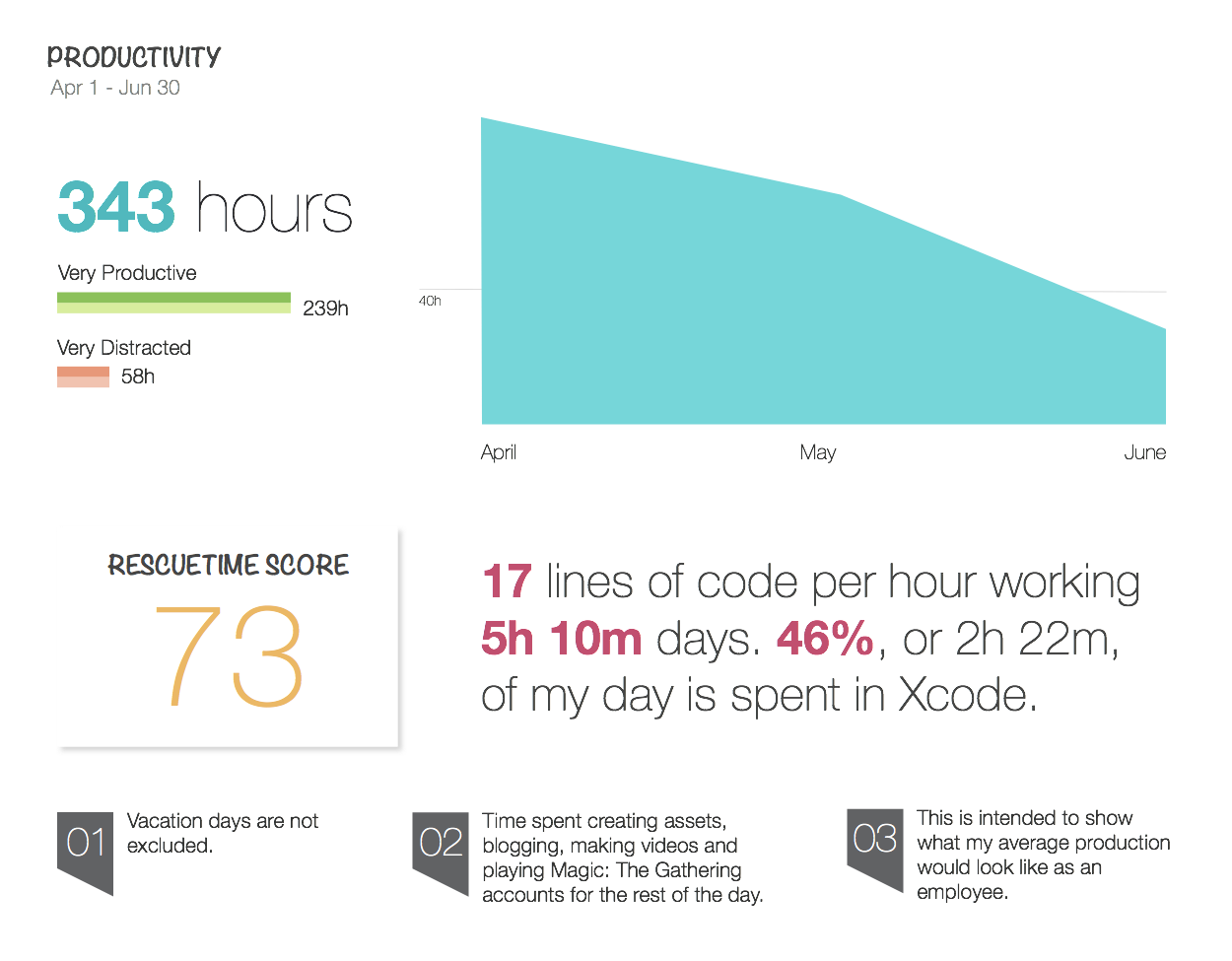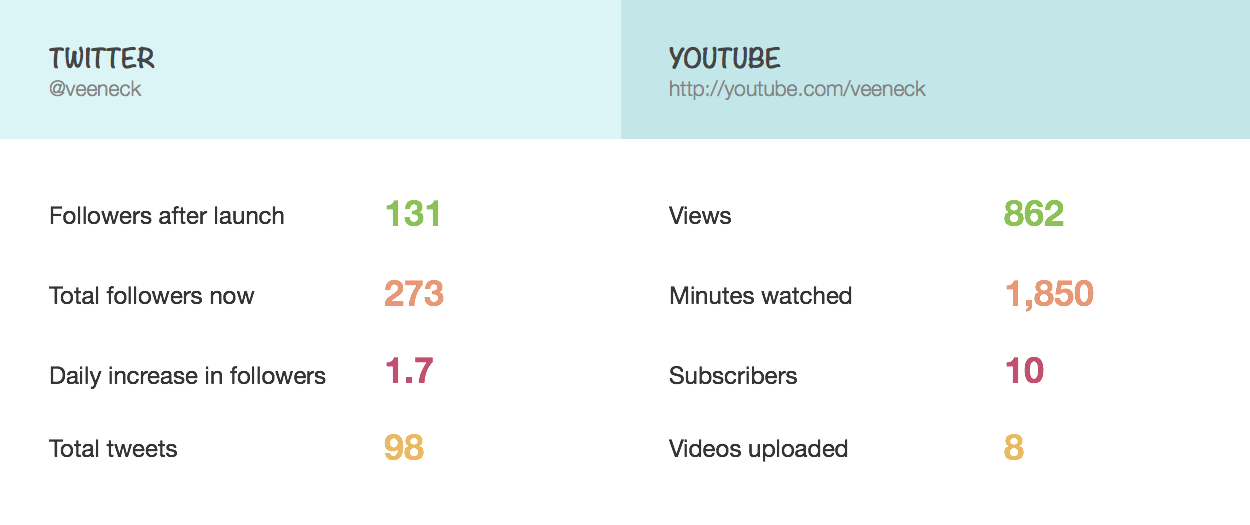Stats From the First Quarter
It’s hard to believe that we’re already 3 months into the competition. My first quarter of game development consisted of many highs and lows, but most importantly I still consider it among the most rewarding things I’ve done. From a purely stats perspective, I think my productivity can be summed up as a strong start, medium middle, and lacking end. I thought it would be fun to look at some concrete numbers, so here is what I came up with.
[ Full Infographic ] [ Current state of my game ]
Code

Overall, it is tough to make any concrete conclusions on these numbers, but here are my thoughts:
- One line of production ready gamedev code is harder than one line of web code. I’d attribute this to web code being predictable and routine while game code is very situational, which requires more thought.
- I truly believe I’ll be able to write faster code in Swift. As a basic example, my largest Objective-C commit back in April came with a ResuceTime productivity score of 91. The similar commit in June with Swift had a score of 72. Part of that can be attributed to experience, but not all.
- Regardless of my switch to Swift, I would have still had to refactor my first two months of work. When learning something new, plan to throw a lot of your mistakes away.
- Looking at deletions, it’s safe to say I refactor or clean up ~30% of the code I write.
Hours
Rescuetime has been a great tool to track hours at the computer, so we have them to thank for the productivity data. In general, I consider myself a very effective worker, so I don’t usually resort to todo lists, bug trackers, or any other project management software. That said, Magic: The Gathering has been a huge distractor at work, so we have had to implement a rule on how often we’re allowed to play. Aside from that, the days at the office have been productive.

Things to consider with this data:
- 17 lines of code per hour is assuming that both my Objective-C and Swift project count as “production ready.” Really though, if we just look at my Swift project as the final version, that number drops to 6.29 lines per hour.
- If you don’t count my vacation time against me, I’m working on a computer for just over 6 hours each day.
- If work is a 9 hour day, the other 3 hours are spent at lunch, playing games, working on art or brainstorming.
- Right now, I’d say I need to increase the 6 hours a day by 30-60 minutes to be content with my effort.
- Work / life balance is solid right now. Definitely don’t have the financial pressure of a start-up, which makes this time around a different type of experience.
Social
I frequently ask myself why I track and care about social stats. Without a doubt, having a large social audience would make launching something easier. But, is an audience a necessity? I feel like most of the people I know with large followings earned their following by putting good work out there. The following was a result of hard work in the beginning — not the other way around. So, while a giant social reach would undoubtedly help, will great products still sell themselves?
The other aspect I’m intersted in conveying is just how hard it can be to make people care about you. With every person blogging and tweeting, it is hard to have your voice heard. It’s also much easier to say “I’ll care about the person when they show me something worth caring about.” If I’m being honest, I wouldn’t have much confidence in a gamedev competition taking place between two random people on the internet, so it is interesting tracking what it takes to get people to stay interested in ours.
With all that in mind, let’s look at some numbers:

As for my thoughts:
- I’m currently tweeting about once per day. I have no desire to artificially raise this number. I’d like to tweet when relevant — not just to play a game to gain followers.
- Even though I only have 10 subscribers, I’ve been pleasantly surprised with my YouTube experience. I’m happy to have my progress documented in video format, and having to show & tell every two weeks is a huge motivational tool.
- Have a look at Chris’s post for stats on our blog. Overall, it is slow, but growing. As personal critique, I’d like to see more concise technical articles. I also look forward to getting out of the learning phase, and into the experimenting phase with game dev. I feel there will be more appeal for concept art, level design, etc.






This is an awesome breakdown! I'll start doing this since I often feel like I'm churning. I can see that you guys are working and making progress. I would like to see you tweet more than once a day. I enjoy seeing people update their followers regarding struggles, triumphs, and plain status updates. I'm curious about when you redactor; does it sidetrack you or does it springboard you write cleaner "new" code?
Thanks for the notes. Refactoring is hit or miss for me. When I'm not rushed, I tend to enjoy the process of reading about, learning and implementing new code techniques. There is a satisfaction with having clean / efficient code. I'd say that happens ~35% of the time. The other 65% of refactoring I tend to hate. Either way, it always results in productive new code – I never regret it.